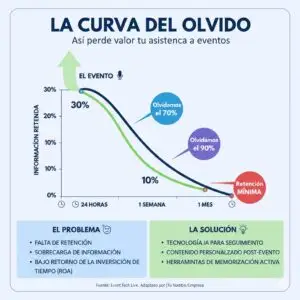Events are a very effective form of communication and marketing for companies and organizations that want to publicize their products, services, projects or ideas. However, organizing a successful event requires good planning and management, and one of the key aspects is event registration.
Event registration is the process by which information is collected from event attendees, either before or during the event. This information may include personal data, professional data, contact information, preferences, interests, etc.
Event Registration Objectives:
- Know the profile and expectations of the attendees to adapt the content and format of the event to their needs and interests.
- Control the capacity and attendance at the event to ensure safety and quality of service.
- Generate a database of potential customers or collaborators for future communication or marketing actions.
- Measure the impact and return on investment of the event through indicators such as number of attendees, degree of satisfaction, level of participation, etc.
To achieve these objectives, it is essential to have an efficient and professional event registration system that facilitates registration and access to the event, that guarantees the protection of personal data and that makes it possible to extract useful information for the analysis and improvement of the event.
In this sense, digitization is an essential tool to optimize registration for events. Digitization consists of transforming physical documents into digital formats that can be stored, consulted and shared through electronic devices such as computers, tablets or smartphones.
4 advantages of digitizing the registry:
- Saving time and resources: By digitizing event registration, the use of paper, printers, photocopiers or filing cabinets is avoided, which means economic and ecological savings. In addition, the registration process and access to the event is streamlined, since it can be done online from anywhere and at any time, without the need to fill out forms or deliver physical documents.
- Increased security and confidentiality: the attendees' personal data is protected against loss, theft or damage. In addition, we comply with current legislation on personal data protection, which requires express consent and a specific purpose for the processing of data.
- Better organization and management: facilitates the creation and updating of a centralized and organized database, which can be consulted and modified in real time. Thus, it is possible to control the number and profile of attendees, send confirmations, reminders or surveys by e-mail or SMS, assign seats or tickets according to established criteria, etc.
- Increased analysis and innovation: By digitizing, a large amount of valuable information is obtained about the attendees and the development of the event. This information can be analyzed through statistical or graphic tools that allow measuring the impact and return of the event, identifying strengths and weaknesses, detecting opportunities for improvement or innovation, etc.
In conclusion, digitization is a key factor in improving the quality and efficiency of event registration. Therefore, it is important to have a platform or specialized software that offers solutions adapted to the needs and objectives of each event.
Sources:















